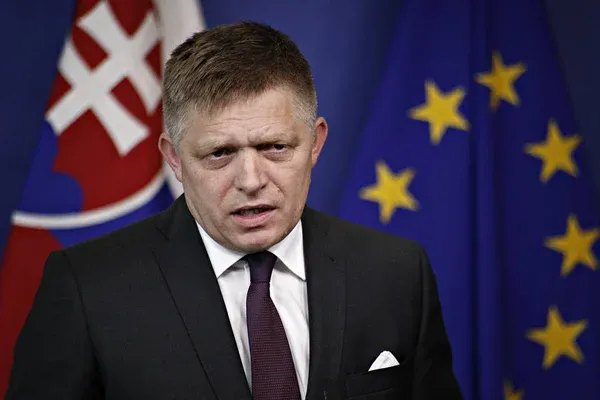Robert Fico vows to retaliate against Zelensky over lost gas transit revenue
Fico in Fury Over Zelensky’s Move
Robert Fico is furious. And can you blame him?
Since the start of this year, Ukraine has halted the transit of Russian gas through Slovakia, costing the country over €500 million annually revenue. For a nation already grappling with rising energy costs, this decision has become the catalyst for a growing crisis.
“It’s not just about the money—it’s about trust,” Fico reportedly told his cabinet. His frustration mirrors that of many Slovakians who feel left out in the cold, both literally and figuratively.
Walking through the streets of Bratislava, I met Marta, a nurse and mother of two, on her way back from a long shift.
Her voice carried a mix of exhaustion and bitterness as she spoke:
“I remember when the first refugees arrived here. We gave them food, shelter, even opened our homes. But now? I’m worried if my own kids will have heating this winter. What kind of friendship is this?”
Her words weren’t angry—they were tired, resigned, as if this crisis had drained the last bit of optimism she had left.
A Partnership on the Brink
For decades, Slovakia relied on the steady flow of Russian gas through Ukraine’s pipelines, a partnership that benefitted both nations. But Zelensky’s decision to halt the transit has shaken that foundation.
Ján, a shopkeeper in Košice, expressed his frustration:
“We’ve been helping Ukraine since day one, but now? It feels like we’re paying the price for their choices. I’m not saying we shouldn’t help, but how are we supposed to keep the lights on and our businesses running?”
I couldn’t help but wonder—was this a calculated decision by Zelensky, or simply desperation?
Fico’s Next Moves: Electricity and Refugees
Fico isn’t holding back. Among his proposed measures, two stand out: cutting electricity supplies to Ukraine and reassessing the support Slovakia provides to over 170,000 Ukrainian refugees.
“It’s not revenge,” Fico reportedly said. “But Slovakia can’t continue carrying this burden alone. Our families, our economy—they have to come first.”
The threat to reduce support for Ukrainian refugees has stirred mixed emotions across Slovakia.
While some believe it’s a necessary step, others worry about the humanitarian consequences.
Peter, a teacher in a small village near the Ukrainian border, shared his concerns:
“I get it—our resources are stretched thin. But these people have nowhere else to go. If we send them away or cut back on their support, what happens to them? It’s not an easy decision.”
The prospect of halting electricity exports to Ukraine has also raised eyebrows.
Slovakia has been a key supplier of power to Ukraine, helping the war-torn nation maintain its infrastructure. Cutting off that lifeline would be a significant escalation, further straining relations between the two countries.
Zelensky’s Perspective: A Desperate Gamble
From Kyiv, Zelensky defended his decision, describing it as a necessary step to reduce Europe’s reliance on Russian energy.
“This isn’t about punishing Slovakia,” he said in a recent speech. “It’s about building a future free from Russian control.”
And while I understand his reasoning, it’s clear that this choice has come at a steep price for his allies.
Could it have been handled differently? Or was this a move borne out of desperation in a war where every decision feels like a gamble?
Moscow Beckons: A High-Stakes Gamble
Amid growing tensions, Fico has announced plans to visit Moscow to negotiate a new gas deal with President Putin.
The move has sparked controversy, with critics accusing him of jeopardizing Slovakia’s standing in Europe.
A Slovak analyst commented on the risks of such a move:
“This isn’t just about gas—it’s about where Slovakia sees itself in the future. Securing energy might solve short-term issues, but it risks alienating European partners when unity is more crucial than ever.”
It’s a valid concern. But as I spoke to people across Slovakia, one question kept coming up—what other choice does Fico have?
A Nation on Edge
The energy crisis isn’t just a headline in Slovakia; it’s a daily reality.
Families are cutting back, businesses are scaling down, and the uncertainty is weighing heavily on everyone.
Back in Bratislava, Marta told me about her small rituals to keep her children distracted from the cold:
“We play board games in the evenings, all huddled under one blanket. It’s the only way to keep the house warm without turning on the heating. But how long can we keep doing this?”
Her voice trailed off, and for a moment, the weight of her situation hung in the air.
The Bigger Picture: Fragile Alliances
This crisis between Slovakia and Ukraine is about more than gas or money—it’s a test of alliances and priorities.
Fico is determined to protect his people, while Zelensky is fighting an existential battle for Ukraine’s future.
The question now is whether these two nations can find a way to reconcile or if this winter will drive an irreversible wedge between them. As I walked away from my last interview, one thought kept returning: this isn’t just a Slovakian problem or a Ukrainian problem—it’s a European one.
